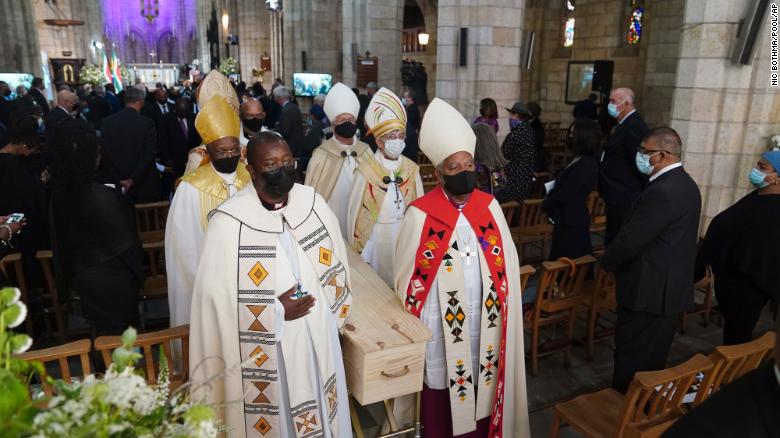What is aquamation? The green alternative to cremation chosen by Desmond Tutu
By Ghazi Balkiz and Jennifer Hauser, CNN
(CNN)Family members gathered to say their goodbyes to anti-apartheid hero Desmond Tutu at a private service at St. George's Cathedral on Sunday, where his ashes were interred in Cape Town and laid to rest.
At his request, the Nobel Peace Prize winner's body underwent aquamation -- considered to be a greener alternative to cremation -- South Africa's Anglican Church confirmed to CNN on Saturday.Aquamation is a water-based process whose scientific name is "alkaline hydrolysis", in which a "combination of gentle water flow, temperature, and alkalinity are used to accelerate the breakdown of organic materials" when a body is laid to rest in soil, according to Bio-Response Solutions, a US company which specializes in the process.
The company's website says the process "uses 90% less energy than flame cremation and does not emit any harmful greenhouse gases."

Desmond Tutu, South Africa's 'national conscience,' laid to rest at state funeralAccording to the Cremation Association of North America (CANA), an international non-profit organization, alkaline hydrolysis is sometimes referred to as flameless cremation.
The body is placed in an alkaline hydrolysis machine, comprised of an airtight chamber filled with a solution made of water and alkaline chemicals. The chamber is then heated, liquifying the body and leaving only bone behind, according to CANA's website.Once the bones are dried they can be pulverized. "The process results in approximately 32% more cremated remains than flame-based cremation and may require a larger urn," according to CANA.

Tutu's coffin is carried out of St. George's Cathedral in Cape Town at the end of his funeral service on Saturday.
Tutu was passionate about protecting the environment -- he gave many speeches and wrote many articles about the need to act to tackle the climate crisis. In 2007, he wrote a piece titled "This Fatal Complacency" for the Guardian in which he addressed the worrying impact that climate change was having in the Global South and on poor communities, as much of North America and Europe was yet to face extreme weather conditions caused by the climate emergency at this time.As well as requesting an eco-friendly alternative to cremation for his body, Tutu also took other steps to ensure his funeral would be as modest as his lifestyle was -- his body laid in state in a simple pine coffin, which was the "cheapest available" at his request, his foundations said.














